Why the Humanities Are Good for Getting Ahead
By Rebecca Goldfine
Last summer, a curriculum committee of faculty, and staff, and students crafted a defense of the humanities to emphasize for young people that these subjects are invaluable in today’s tech-centric world.
“Engagement with the humanities—the arts, literature, history, philosophy, and other fields—fosters a lifetime of curiosity, wonder, learning, and community. The humanities represent fundamental ways of being and knowing in the world,” said Senior Vice President and Dean for Academic Affairs Jen Scanlon, who leads the committee.
She shared a list of qualities the committee believes are developed and strengthened in humanities classes. Among them are “showing empathy, fine-tuning self-expression, feeling wonder, celebrating humanity in its complexities, cultivating the capacity for curiosity, knowing that one is not alone, being able to move outside of oneself and understand one’s place in the world, developing a global sensibility, and viewing stories as teachers.”
The following is a list of just some of the attributes Bowdoin faculty and administrators say are developed in humanities classes.
- Empathy
- Self-expression
- Awe
- Curiosity
- Connection to the world beyond one's self
- Less loneliness
- A global sensibility
(As for knowing one is not alone, English professor Tess Chakkalakal agreed, saying that “reading books has the potential to alleviate many of the problems we have created—first and foremost, loneliness.”)
Some would argue, too, that these attributes are fundamental ways of being in the workplace. Kristin Brennan, executive director of Bowdoin’s Career Exploration and Development (CXD) office, said these kinds of “softer” skills provide benefits with long shelf lives.
“Over a lifetime, the kind of things that help you get rewarded, promoted, and more responsibility are a lot of critical-thinking soft skills—an ability to communicate powerfully and the ability to have empathy and insight into the people you’re working with, and into what motivates them,” she explained.
The CXD office keeps a printout of employers’ most coveted attributes in employees, based on an annual survey conducted by the National Association of Colleges and Employers. Referring to it, Brennan said, “Year on year, they are these major buckets: relationships, communication, management of self and of others—or leadership, analytical and critical thinking, problem-solving skills, including quantitative and qualitative skills, and creativity. These are found in humanities classes.”
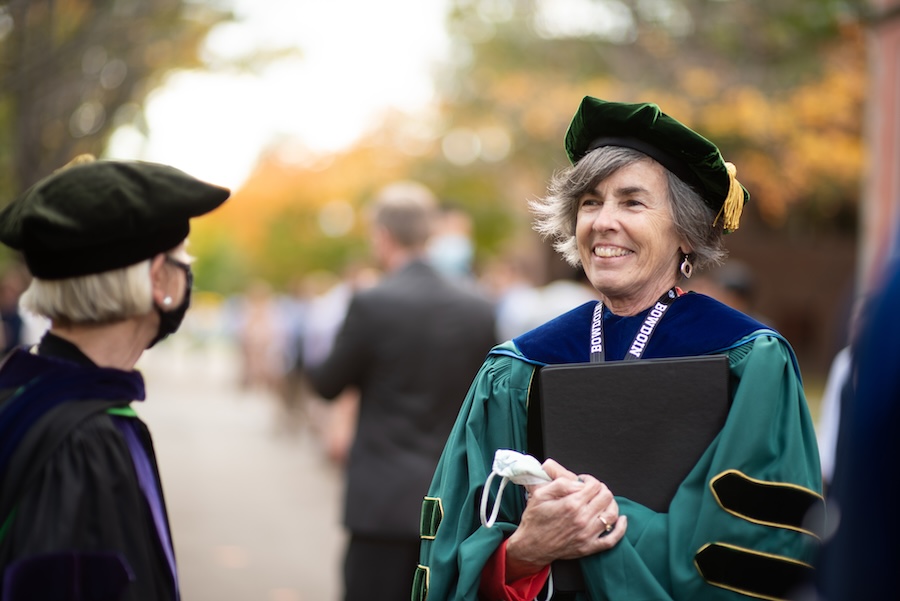
“So what you see for those people who have paid attention to these things, which are available in a broad liberal arts curriculum, is that over time that pays off,” she concluded.
There is evidence to back her up. A 2019 New York Times article summed up research comparing the longer-term career outcomes of humanities and STEM majors (science, technology, engineering, and mathematics). While STEM majors start out earning more—sometimes significantly more—than their humanities peers, as the years pass after they leave college, the gap between their earnings and those of humanities and social science majors narrows.
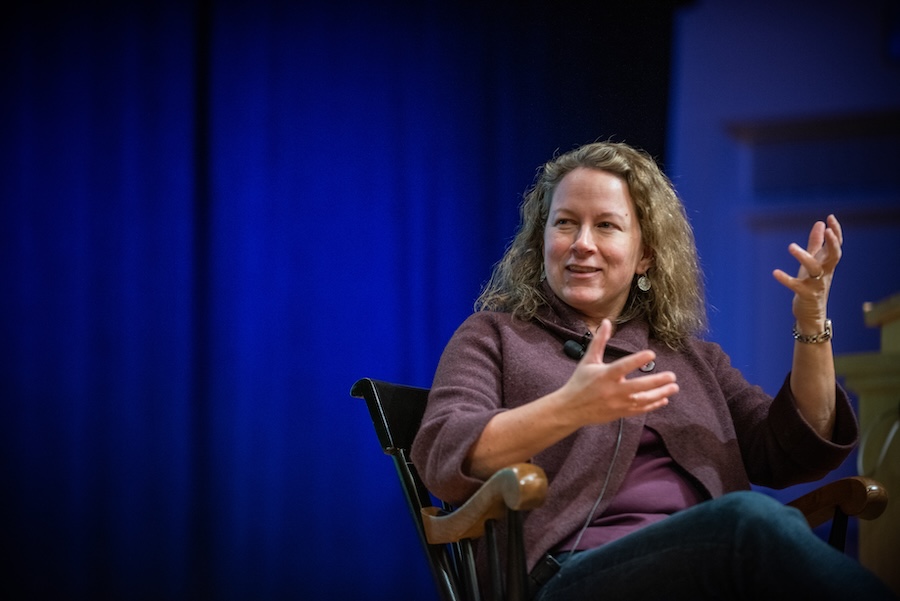
“The advantage for STEM majors fades steadily after their first jobs, and by age forty the earnings of people who majored in fields like social science or history have caught up,” writes David Deming in the Times article.
This happens for two reasons, Deming suggests. First, STEM majors might start their careers being experts in the most up-to-date technology, but their technical skills can become obsolete as technology advances, forcing them to compete with younger people more familiar with the latest innovations. “The result is slower salary growth and high exit rates from the STEM workforce,” he writes.
Second, humanities students tend to be adept at problem-solving, critical thinking, and adaptability. “A traditional liberal arts curriculum includes subjects, like philosophy and literature, that seemingly have little relevance in the modern workplace. Yet many of the skills most desired by employers are also quite abstract,” he notes.
Humanities professors at Bowdoin understand that the modes of learning that happen in their classrooms push students to think abstractly. Those who have been teaching a long time have seen how that plays out in their students’ careers.
While being intimately familiar with books like Moby-Dick and Sir Gawain and the Green Knight are not obvious throughlines to getting a job, professors Tess Chakkalakal and Emma Maggie Solberg, who teach these texts in their English classes, tell their students that when they’re immersing themselves in nineteenth-century and fourteenth-century texts, they’re gaining workforce abilities.
“The good news is that employers want to hire students from liberal arts colleges.”
—Kristin Brennan, executive director of Career Exploration and Development
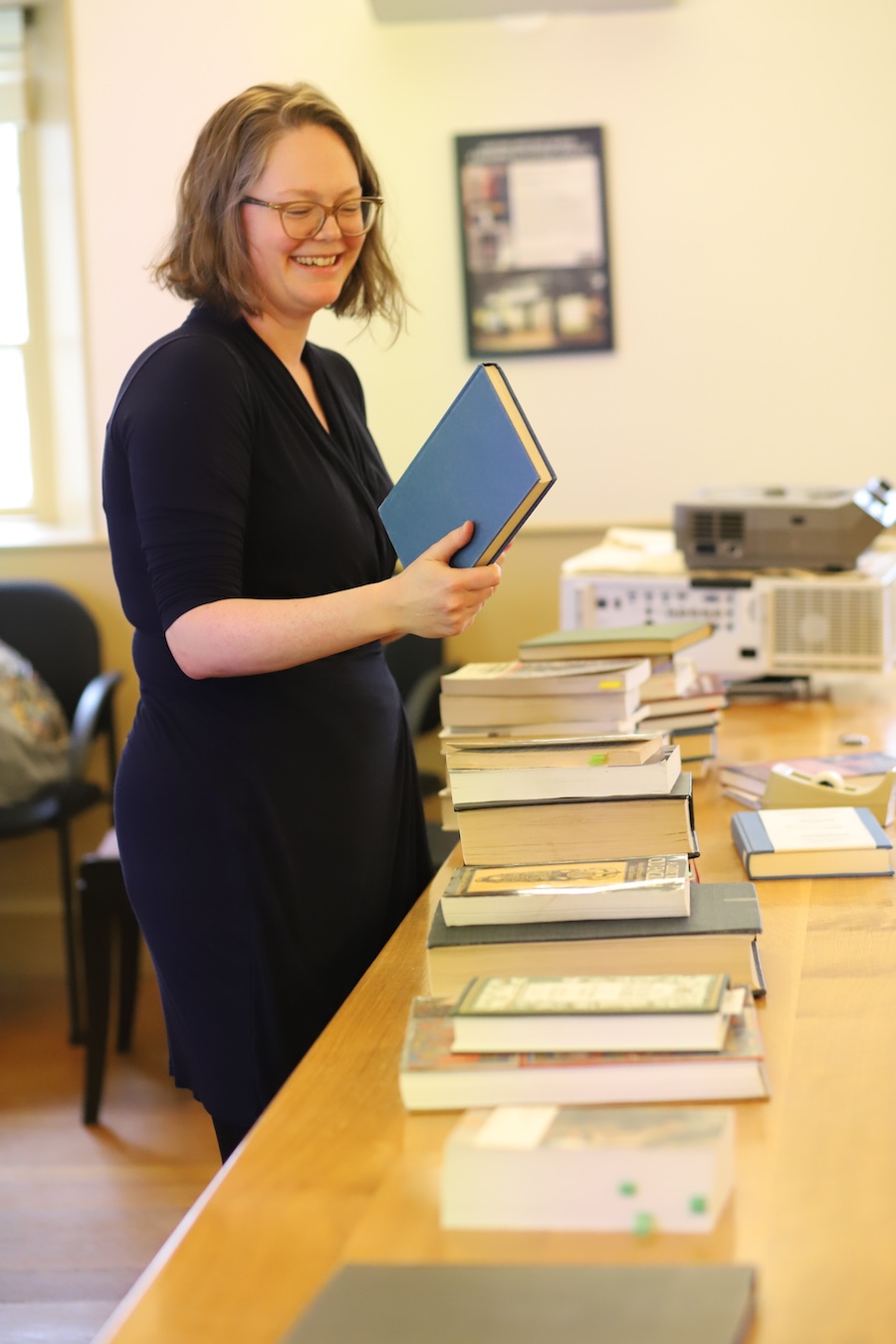
“Writing and communicating orally are probably the most important skills you need for getting a job, keeping a job, and being promoted,” Chakkalakal said. “I am very explicit about that. Students will find themselves in meetings for the rest of their lives—with the kind of jobs our students get—so they need to figure out how to communicate their ideas effectively.”
Solberg describes what she’s doing as “teaching students how to look in the dark.” She brings up an allegory of a man looking for his lost keys and only searching in the circle of space illuminated by a streetlamp. When he’s questioned why, he answers, “That’s where the light shines.”
“That is a humanities metaphor,” she said, one that refers specifically to the texts and information that have been digitized and are often the only resources accessible to some people, “or the only thing Google knows, so the only answers you can find.”
“Teaching students how to look in the dark is what I can give to them for their whole lives, and I know every employer wants that—what you can find if you look any other way than everybody else. That is valuable, and I can teach it.”
She also coaches her students to become the person in the room who can speak up, change the conversation, and say what nobody else is saying, especially if what needs to be said is controversial or risky. “That doesn’t come in a day, that comes out of being in a classroom, with training, conversation, deliberation, and collaboration.”
“Teaching students how to look in the dark is what I can give to them for their whole lives, and I know every employer wants that—what you can find if you look any other way than everybody else. That is valuable, and I can teach it.”
—English professor Maggie Solberg
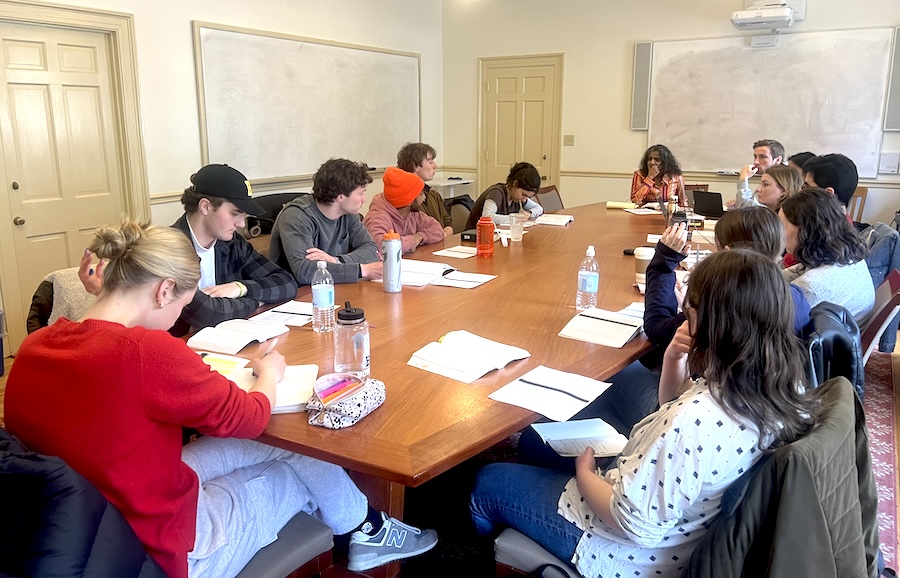
“Critical intelligence, independence of thought, and the ability to find information in difficult places—all of those things are really hard to teach, and I feel we teach it really well in humanities courses,” she said.
Though senior Andy Stoneman ’23 is majoring in computer science and minoring in physics, he’s made a point of taking many humanities classes at Bowdoin, almost a third of his total class load. When asked why, he says he picks courses that seem interesting and will make him think deeply.
“I try to continuously reflect on what I am getting out of my humanities classes,” he added. “I think the humanities allow you to study people—their motives, purposes, values, and morals. STEM doesn’t grant you that in the same way; it can, at times, but most of the time, you’re learning about how a thing works, even if it’s theoretical. I think it is important to be balanced and learn about all facets of life.”
“Writing and communicating orally are probably the most important skills you need for getting a job, keeping a job, and being promoted. ”
—Tess Chakkalakal, associate professor of English
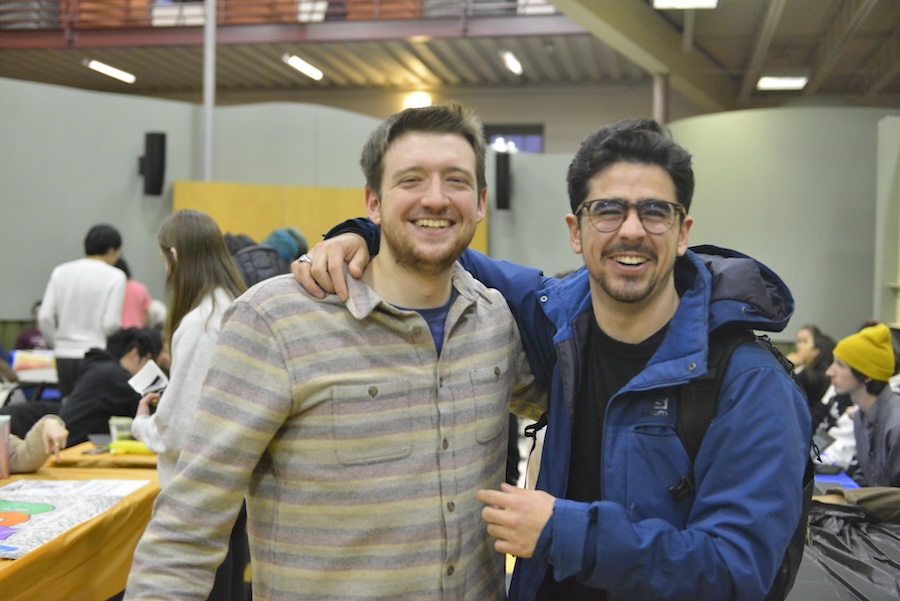
Philosophy and English major Edmundo Ortiz Alvarez ’23, right, with a friend.
By February of this year, Stoneman had a job lined up as a software engineer for ForeFlight, which creates software for pilots.
But he’s far from being the only senior with a job waiting for him after graduation. Dedicated humanities student Edmundo Ortiz Alvarez ’23, who majored in philosophy and English, will start as a consultant for BCE Consulting in Boston, a job he chose because he will earn enough to give away 10 percent of his income to charity.
“The humanities taught me all the hard skills, and also the soft skills—how to understand a person, how to interact with people, how to live a fulfilling life, what my role in life is, what is my obligation to those around me, myself, to future generations, and to those I don't know,” he said.
Connecting the Dots
Though the topics explored in the humanities can deftly prepare students for modern careers, the link can remain hazy for some. Bowdoin is trying to make it more obvious.
All the faculty interviewed for this article said they regularly remind students that what they practice in class—critical thinking, creative thinking, speaking persuasively and clearly, writing persuasively and clearly—has value in the workplace.
Assistant Professor of Philosophy Aliosha Barranco Lopez, for example, tells her students that studying philosophy, and especially majoring in it, “is pretty good for your job prospects. Philosophy is known by employers as a field where students are trained to be very careful with information. They can spot contradictions and they can be clear when they’re proposing ideas.”
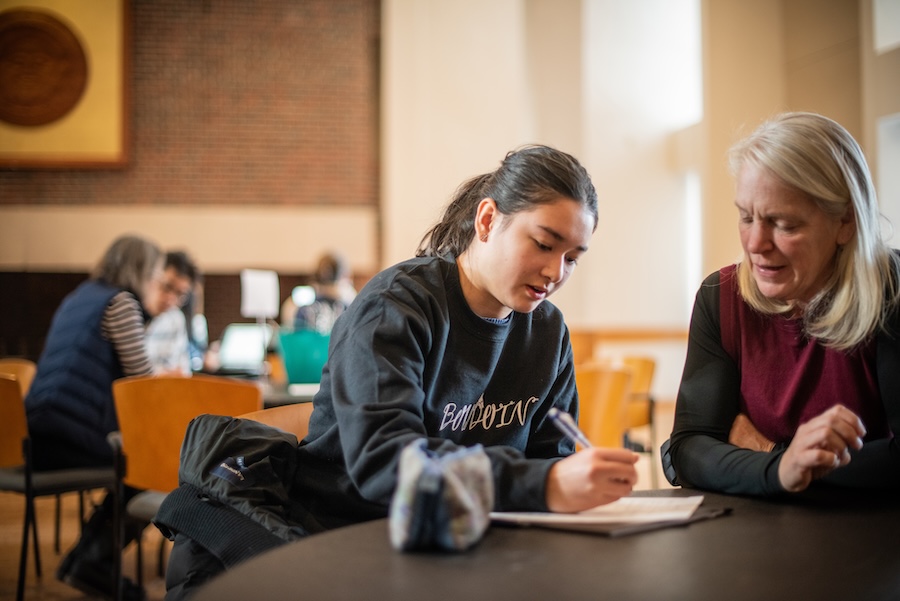
She directs her students to Bowdoin’s CXD office to reinforce that idea. “It seems part of the problem is that students have this misconception that they can only get a job if they study economics or computer science. But if they go to CXD early on, they can see there are a lot of different job paths they can take,” she said.
When students do swing by, Brennan says they will find many job and internship opportunities awaiting them. “The good news is that employers want to hire students from liberal arts colleges,” she said. “In the aggregate, the set of employers in the US hiring market that are trying to hire undergraduates have options of schools to post jobs to, and they have options of which student attributes to choose. Tons pick the liberal arts schools as places they want to hire from,” she said.
When it comes to majors, however, employers can be overly literal when faced with simplistic “picklists” used by job boards, Brennan said. They might not be fully aware of the value of humanistic learning or of the interdisciplinary strengths Bowdoin students develop as liberal arts learners.
To counter this, the CXD team counsels students not to be limited by what they see online, but to rather seek out opportunities that interest them and to look more deeply into what the job actually requires—for instance, strong writing and creativity.
If a posting is, for example, asking for a marketing major, Brennan will tell a student, “Look, you’re going to do really well alongside marketing majors—you have what this job calls for and more. Let’s talk about how in your cover letter.”
“The employers we work with closely understand a liberal arts education is the best possible preparation,” she added. Students just have to spell out exactly why.
A Major Oversight
A liberal arts education offers a holistic experience in which students practice collaboration (and peaceful cohabitation in residence halls and shared dorms), wrestle with ethical decision-making, and practice debating ideas—both in and out of the classroom.
Yet, at times that immersive educational environment can be overshadowed by both students’ and employers’ over-emphasis on majors.
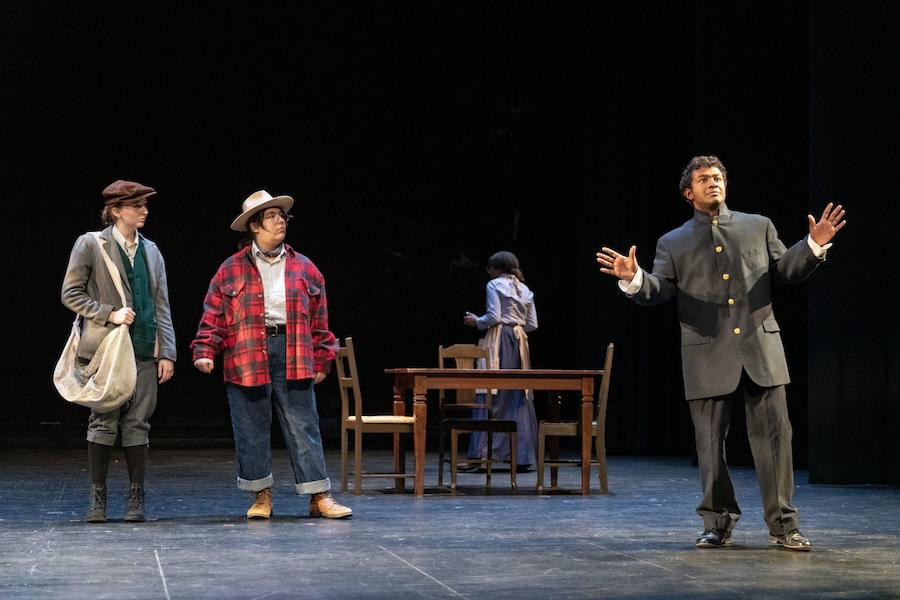
“The major is just one aspect of what you’re doing while you’re here,” Brennan said. “It’s often the most visible, but it gets loaded with too much importance by students and by some employers, because no major provides technical training or position students for a particular role. That is the beauty of the liberal arts— majors can be applied in many ways.”
Those who teach in the creative disciplines, such as theater, dance, and visual arts, are especially vocal about the success they see their students achieve after graduating, even in fields well outside of the arts. “I have seen my theater students go into law, medicine, education, nonprofit work. I’ve seen them go right to work at Google!” Professor of Theater Davis Robinson said.
Theater, he believes, epitomizes the liberal arts and its interdisciplinary nature. To write or produce a play, for example, he said, “You have to study history, religion, cultural issues, political issues. It gets into psychology—learning to take on and empathize with other people’s needs. It teaches you to interpret motives and see why different people do what they do.”
“Our major is trying to understand humanity and how do people survive what they’re going through in this world. The arts and humanities are what you go to when your life is falling apart, or when as a culture, you’re trying to figure out what to do in a crisis,” he added.
Spreading the Word
Going forward, more Bowdoin faculty and administrators are being intentional about weaving in messages about the value of the humanities in the work they do with students. In this way, professors and staff are equipping students and recent graduates with the language they need to articulate how their education has prepared them to be exceptional employees.

“One thing we owe all the students—not just the humanities students—is the opportunity to translate what they’re doing, all their work, curricular and extracurricular, into language they’ll be using to share who they are with the broader world,” Brennan said.
Brennan said that CXD advisors enjoy partnering with faculty to talk to their students about how studying English, sociology, or any of their humanities or social science disciplines connect to the working world. Other faculty take on that initiative themselves, Scanlon said. “One of the things faculty do is to talk in their classes about the why—why does this work matter? And the what: What does this enable you to do? How does what we’re doing in this space enable you to live richer, more fulfilling, more connected lives, including more fulfilling professional lives?” she said.
“In an era in which doubt is cast on the value of the humanities, it is incumbent upon us to talk about, celebrate, and emphasize humanistic learning and its place in our classrooms and our lives. We have to bring to the surface elements of our work that many of us have taken for granted, and to find better ways to articulate the gifts and the skills of the humanities so that our students can do the same.”
Brennan agreed. “Professors can say to students, ‘You know what we’re doing here, by the way, with these public presentations and critiques, is we’re improving our oral presentation skills and we’re practicing empathy and coaching—which is a management/leadership skill.’ Because it is not easy to give someone feedback on their hard-won, heartfelt project.”
“The students are getting what they need here,” she concluded. “They have immense talents, skills, and potential that are all applicable to the jobs they’ll be doing next. But they currently live in this world at Bowdoin and they need help connecting this experience to the next one.”